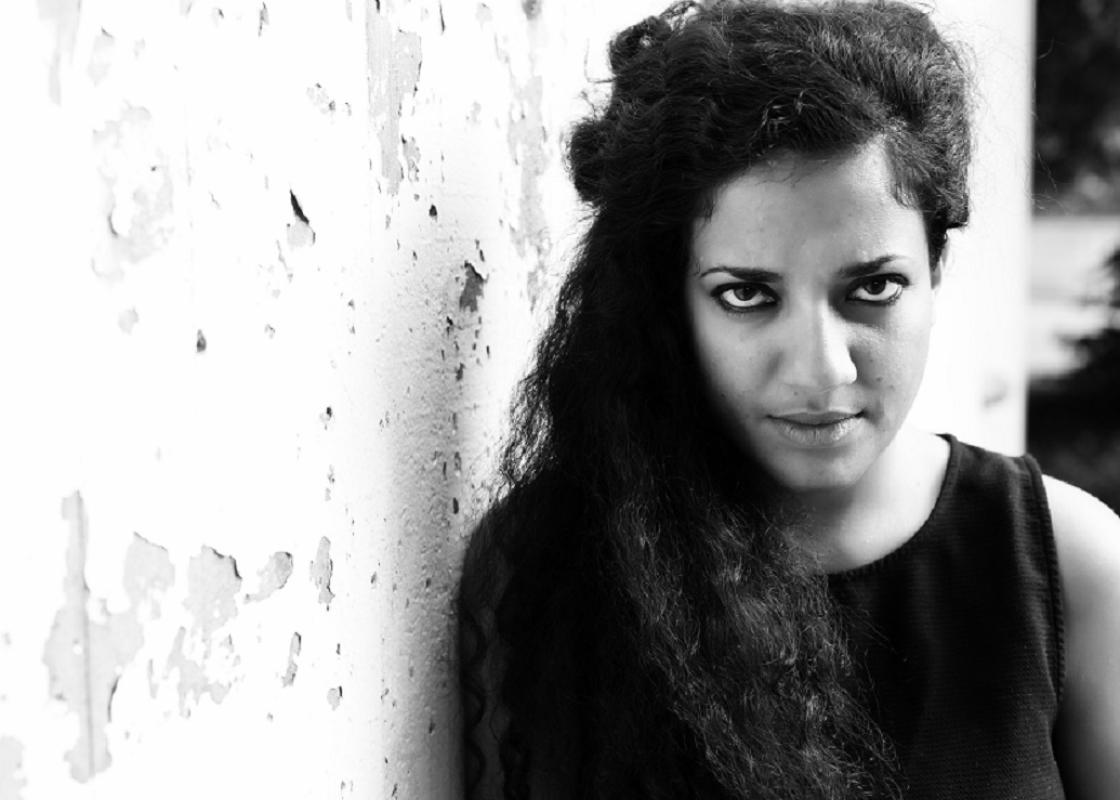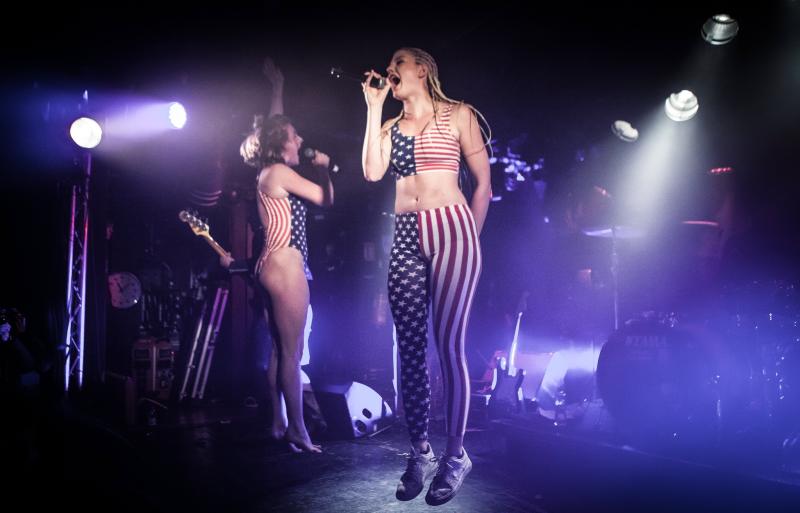“Why do they follow me up and down the streets in every country I come to? Answer me that? I sit down on a beach under the umbrella and a big, fat man comes over, sits down and starts talking about his life while I sit and try to save my own. Why do you think I fled? (…)” (editor's translation).
The excerpt above is taken from the poetry collection White girl, written by the Danish poet Christina Hagen. The collection was published just before the summer holiday in 2012, but it is no easy-to-read beach literature. The poems are based on real postcards from ‘white people’, as Hagen herself explains on the back cover of the book. They are about a number of horrible encounters that a young female tourist experiences at the various places she visits. White girl gets angry and frustrated by being both sexualised and treated as privileged at the same time.
You can’t criticise the top when you’re on top yourself, you can only be criticised.
“The book has been interpreted in many different ways, both as a confrontation against the politically correct and as criticism towards whiteness. What makes it so interesting is the dialogue it creates,” says Kristina Leganger Iversen.
Her dissertation is written as part of the research project ScanGuilt at the Univeristy of Oslo, which explores issues related to Scandinavian privileges and guilt.
Whiteness hegemony

The poetry collections address concepts like coloniality, whiteness and non-whiteness in various ways and in her thesis, Iversen studies the implications of such terms for the sense of national belonging.
In this article, we will take a closer look at three of the collections: White girl, Flaggtale (‘Flag Speech’) and Vitsvit (‘White Suite’). Central terms throughout her thesis are criticism towards whiteness and whiteness hegemony.
“Whiteness hegemony means a strong social norm indicating that white people are considered neutral in society whereas the non-whites are often seen as ‘strangers’,” says Iversen.
“There is a certain way of talking about those who are considered a natural part of the nation and those of less obvious belonging.”
She has also looked at how whiteness and coloniality contribute to the formation of the first-person voice in the poems.
Us and the others
One of the first-person voices, in Dan Andersen’s Flaggtale, is a white, privileged middle class man who struggles with his role as precisely a white, privileged middle class man, says Iversen.
“The ‘I’ in the collection does not think of himself as white, but when encountering other, non-white, they are referred to as niggers or Arabs. They are not part of the national community that the ‘I’-voice speaks on behalf of,” says Iversen.
“(…) You have walked them to kindergarten,
Wondered about the little Arab kids with satchels Nobody blames you, Pauli
Have you heard the joke about the Bedouin and the camel, Pauli?
About the difference between their teeth, Pauli? Never mind
and get to work There’s the tram The sun is shining
and it’s not easy to see, Pauli The tram is full
of niggers and mulattoes and it is not allowed to say that, Pauli
It is not allowed to say that!” (editor's translation).
The white man’s burden
The book Flaggtale was placed within a colonial context when it was published. In the publisher’s mention of the book, they referred to Rudyard Kipling’s poem ‘The White Man’s Burden’ from 1899, which ironizes the West and its responsibility for the colonised: “In 2016, the white man no longer has an empire to manage. But life on the top is still a heavy burden resting on his shoulders.”
“It is interesting to see who identifies with the ‘I’ person, who interprets the poems as national criticism, and who considers them a parodic exposure of a minor group,” says Iversen.
His feelings become more important for him than the woman’s.
The book received very mixed reviews. Knut Ødegård in the national newspaper Vårt land praised the book for openly addressing ‘our’ lack of empathy, whereas Hedda Lingaas Fossum in Morgenbladet and Silje Stavrum Norevik in Bergens Tidende were critical to the ‘I’ voice. They thought he was exaggerated and not representative. The man in the book feels pressured between living a calm middle class life and the increasing competition among men. He defends being ‘rough during sex’ and he beats his pregnant wife.
“The book addresses the nation’s double standards such as being a peace nation that sells weapons or a green nation that pumps oil. These are dilemmas that many people can relate to,” says Iversen.
At the same time, the subject is violent, and does not want to take responsibility for his own actions and behaviour towards those closest to him.
“This is something that is very difficult to relate to for many people. I think that those who can identify with the subject primarily relate to the national criticism.”
Guilt and shame
Iversen points to the way in which various transgressions of highly differing severity are juxtaposed, such as rape and drunkenness. The following is an excerpt from the book:
“(…) I myself only regret one thing
It happened in High School, second year,
and in the beginning I was too harsh with myself,
held a low profile, didn’t want to leave the room,
was sad and empty, almost couldn’t eat
She slept, I should have seen that,
but I wasn’t entirely awake myself
To be honest it was more like a dream than reality
And I think that what some people say is true:
Being forgiven by others is one thing, but first
You have to learn how to forgive
yourself” (editor's translation).
“His feelings become more important for him than the woman’s. It is connected to the first-person’s understanding of himself that the more privileged he is, the more vulnerable he becomes. You can’t criticise the top when you’re on top yourself, you can only be criticised,” says Iversen.
The man experiences a feeling of being more vulnerable than the woman precisely because he is superior. The idea that it is hard to be privileged appears repeatedly both in this poetry collection and in White girl.
“Being privileged entails guilt and shame, and is therefore more difficult than not having access to basic resources. But the poems may also be interpreted ironically and thus be read as a criticism of the stereotypically Scandinavian,” says Iversen.
Ambiguous tourist
In Christina Hagen’s poetry collection White girl, the criticism is not as clear. Yet it is just as interesting, according to Iversen. In this book, the young, female tourist complains about the local population pestering her, and that they don’t understand that she has a broken heart. The fact that she is regarded as a white, rich tourist without any problems makes her angry.
The idea that it is hard to be privileged appears repeatedly.
The poems are written in so-called ‘perkerdansk’ or ‘immigrant Danish’, which disturbs the meaning of the poems in their entirety. According to Iversen, it contributes to the ambiguity of the criticism, and makes it difficult to interpret in one specific direction.
“Why does she speak that way, and what does it really mean? Some critics have thought it is because ‘perkerdansk’ is the language that ‘the other’ that she encounters can understand. Others think it suggests that white girl comes from a lower class background herself.”
See also: Blond, sexy and immigrant
The controversy of meaning
“One of the critics connects White girl’s racist remarks to her being white trash herself, another thinks she is psychologically pressured or exhausted and burnt-out. You write that this is problematic. Why is that?”
“Because it builds upon an idea that these sorts of thoughts and reactions are shared by everybody, but some people manage to restrain themselves,” says Iversen.
According to her, this has to do with the idea of the politically correct; that instead of saying things as they really are you would rather change your remarks in order to make them sound better.
“It is also possible to read Hagen differently; that she addresses some major problems in a politically incorrect manner. She is criticising without being moralising. I think it is very interesting how she intensifies the contrast.”
Iversen wanted to explore a work that has been subject to controversy in terms of how we should understand the book and what it means.
“My point of departure for my thesis was to explore works that have received mixed reviews.”
White on black
The poetry collection Vitsvit by Athena Farrokhzad from 2013, addresses topics such as family, whiteness hegemony and resistance. All the poems in the collection are represented as statements from family members. The exception is the first poem, in which the first-person speaks directly to the reader about her mother and her family’s encounter with Swedish society:
“(…) In the days she changed between long and short vowels
as if the sounds that came out of her mouth
could wash the olive oil off her skin
My mother let the bleach run through the syntax
On the other side of the punctuation mark her syllables became whiter
than a north Swedish winter” (editor's translation).
Iversen describes the poetry collection as a whiteness critical project. She understands the title Vitsvit as a suite about whiteness. And she interprets the language as representing whiteness typographically, as the poems are printed as white words upon black streaks. Additionally, several poems in the collection revolve around the family’s adjustment to the white, such as the opening poem:
“The family moves to a Sweden that is represented as a white space, epitomised through the white winter. The mother’s role in the book is to create a safe home for her family. To the daughter, this entails that she adjusts too much to the whiteness and traditional gender roles,” says Iversen.
“The mother regards her daughter as an idealist, representing an idealism that she might have identified with, but circumstances have forced her to take a more pragmatic stand on things. I think the first-person sees this dilemma, and the book demonstrates how everybody’s stands are understandable, although they also have their disadvantages.”
Translated by Cathinka Dahl Hambro.
See also: Surrogacy: The impossible dream of a fair trade baby
Kristina Leganger Iversen defended her PhD dissertation Når dikta tiltaler nasjonan – kvitheit, kolonialitet og subjektivitet i sju samtidige skandinaviske diktbøker (‘When the poems address the nations – whiteness, coloniality and subjectivity in seven contemporary poetry collections’). The dissertation is written as part of the research project ScanGuilt at the University of Oslo. Iversen has also published the poetry collection Hjertemekanikk (‘Heart mechanics’, 2011) and the novel I ringane (‘In the rings’, 2015).



